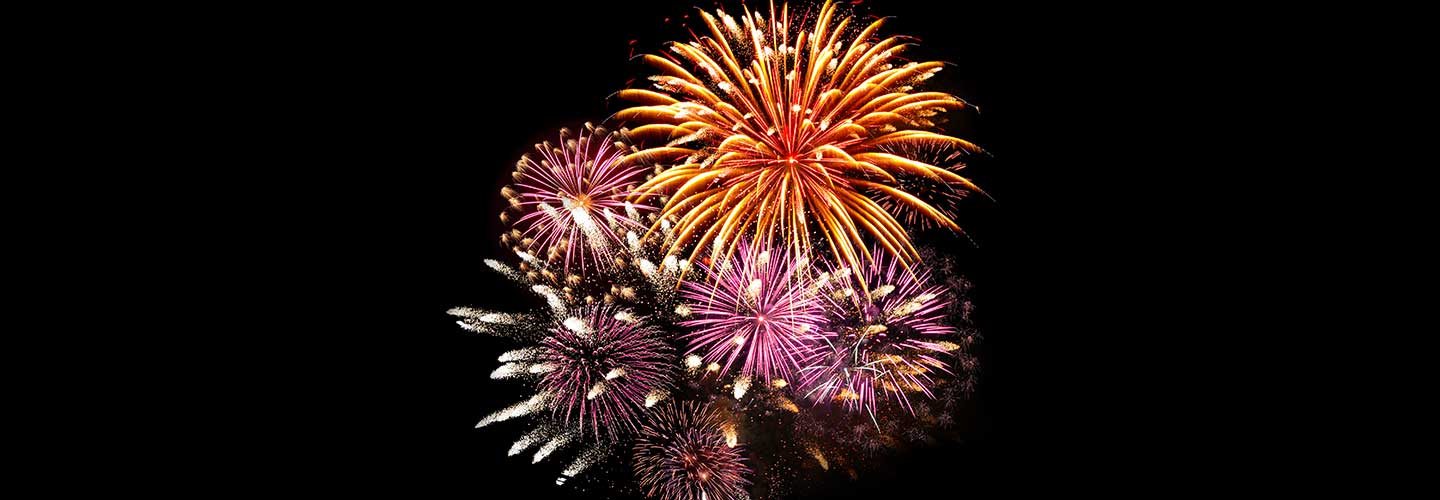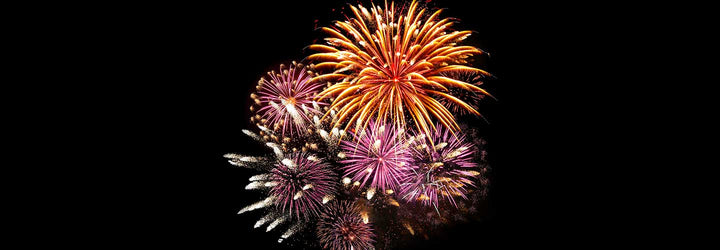

Posted by Emma Oldroyd, on
Pet Safety During Party Season: Coping with Fireworks
Remember, remember, fireworks aren't just in November!
It is estimated that approximately 45% of dogs become stressed and fearful while fireworks are going off, yet many owners are unaware of how to help their pets with firework fears and the precautions that can be taken to help them cope with their fear of loud noises.
Helping dogs with firework fears
Signs of anxiety in dogs include:
• trembling and shaking
• licking of lips
• panting
• chewing objects
• clinging to owners
• cowering and hiding
• unable to settle
• trying to dig
• barking excessively
• urinating or defecating
What can dog owners do to help their pet?
An important step is to ensure the dog has a safe space or den to retreat to in the home; an area that they feel secure in. Ideally this should be in an internal room that is easily accessible and away from windows. The den can be a place that the dog already uses and adapted to be as comfortable, dark, and quiet as possible, or a man-made temporary option such as a cardboard box or crate. Preparing a den in advance allows the dog to get used to the area and accept it as a safe place. Whatever format of den is chosen it is also advisable to use towels and/or blankets to cover the area to dim the sounds and lights of the fireworks and ensure the dog has access to the den at all times.
The dog appeasing pheromones such as ADAPTIL and Pet Remedy have been shown to reduce anxiety and help dogs cope with challenging situations, including firework events. They is easy to use and it are available as a diffusers, collars and sprays.
Pheromone products help reduce the intensity of the dog's fear response and should be used alongside other measures to manage or treat sound sensitivities, such as building a den. Using a diffuser or collar from October can help to combat any build-up of anxiety the dog experiences in the run up to the fireworks event.
Further tips for dog owners
● Ensure dogs are taken out for a walk/to the toilet before it gets dark to avoid the need to be taken out later during the fireworks.
● Soothing or punishing the dog may increase the intensity of the experience or reward inappropriate behaviour. Instead consider distracting them with a chew, toy, puzzle feeder or a game. Having a meal before the fireworks start can also help as a dog may not want to eat during the event if they are too anxious. Shop all dog toys and puzzles here
● Ensure the dog has access to their water bowl as anxious dogs can pant more.
● Keep curtains closed, have the TV or music on and keep the dog company.
● Dogs with a more severe reaction to noises should be taken to the vet, as it may be that they need medication to cope with the firework season.
● Be aware that older dogs may find fireworks more challenging than they have before, as they can start to find changes to routine difficult. Alternatively, those dogs which start to develop hearing loss as they age can find fireworks easier to cope with.
What about cats?
Cat are not thought to develop sound sensitivities as dogs do, however they will be frightened by the loud bangs and flashes of fireworks. We advise that you keep your cat indoors, but this change in routine and confinement to the home can sometimes cause cats to become upset and show unwanted behaviours such as urine marking, inter-cat tension and vertical scratching.
You can help your cats cope with these changes by providing enough litter trays throughout the house and ensuring all the cats in the household have safe places to hide in. These are often are up high, for example on the top of cupboards, but could also be under a bed or in a box. Once a cat has found a safe spot for the night, leave it alone and do not try to coax it out, as this refuge is where it feels most secure.
Feliway for cats is a range of cat-specific pheromone products to help reduce their stress levels and anxiety during firework season.
What about other pets?
Small animals and birds all need to be treated with special care as these animals are easily frightened. Hutches, cages, and enclosures should, if possible, be brought into a quiet room indoors, or into a garage or shed. Providing extra bedding for them to burrow down in can help the pet feel more secure. Aviaries should be covered with thick blankets to block out the sight and sound of the fireworks, but care should be taken to ensure there is enough ventilation in the aviary.
Horses and ponies
Fireworks must not be set off near livestock or horses in fields, or close to buildings housing livestock. Anyone planning a firework display in a rural area should warn neighbouring farmers in advance and the fireworks should be set off in the opposite direction to their field and well away from them. Horses should be kept to their normal routine and can be left in their field so long as it is safe, secure, and not near the fireworks display area.
